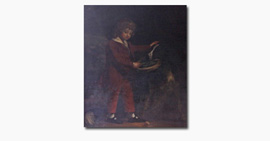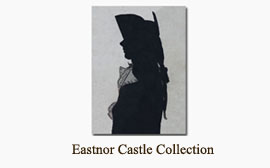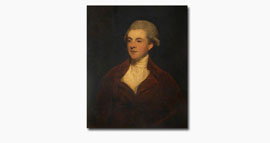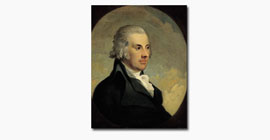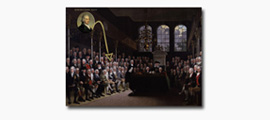Edward James Eliot: Caring for His Darling Daughter
Two days after the elaborate funeral for Lady Harriot, Edward James was persuaded to journey for a short time to Holwood House, Pitt's country seat in Kent. It was not long, though, before they returned to Downing Street for his little daughter's christening. This normally happy occasion was a heartbreaking day for the widower father who could not help recalling his recent expectations of sharing the joy of the event with his wife. During the "hour of happiness and exultation" after his daughter's birth, Edward James had written a hasty letter to his father, asking him to stand as Godfather to this first grandchild. In the grief-stricken days following Harriot's death, Edward James decided to bestow that honour on some of "the nearest and dearest friend and relations of the deceased." He composed a truly heartrending letter to his father, explaining his change of mind and asking his father's consideration on "a mind never very strong, and more weaken'd by calamity". The Dowager Lady Chatham and Mrs. Pretyman (a dear and long-time friend of Harriot) acted as Godmothers, and Pretyman himself performed the ceremony. The baby was christened Harriet Hester, after her mother and maternal aunt — being the two daughters of the 1st Earl and Countess of Chatham.
Following the ceremony, Edward James and Pitt traveled with a party of servants down to Burton Pynsent, where they left precious little Harriet in the care of her maternal grandmother. Edward James spent as many weeks as possible at Burton; when he was obliged to be in London, Lady Chatham sent regular reports about the progress of his little girl.
Like all first-time parents, Edward James and Harriot had made a number of plans for their new life as a family of three. She had many thoughts and ideas of spending times at Burton with her mother, and he prepared for the new arrival by taking a Downing-street house of their own at No. 15. Edward James' name appears on the tax lists beginning in the end of October 1786, so he must have gained possession of this new house in the days just after Harriot's death. He only kept it for one year, and it does not seem that he spent a great deal of time there — being most often at Burton Pynsent or Pitt's house. Uncomfortable alone, he could not face the idea of separating himself from his brother-in-law's house and decided to stay at Pitt's house (from which he did not depart until 1792).
Harriet Hester's well-being was ever-present in her father's thoughts, and with this in mind, Edward James penned a will from his Downing-street home on the twenty-fifth of March, 1787. Addressed to his brother John and brother-in-law, William Pitt, Edward James' heartbreak after losing his dear Harriot is exemplified in the opening of the private document:
"Written on this twenty-fifth of March, soon after twelve o'clock, six calendar months after I had seen my last of almost all I hold dear in the world, my beloved Harriot — but in earnest and anxious expectation of a future and happy meeting. My will and desire is to leave everything I am possessed of to her and my only child."
The reason for the will had been simply stated in that opening, and the rest of the document is quite short and concise. Basically, he left instructions for investment of money and the guardianship of his most beloved daughter.
Edward James and Harriet Hester shared a close relationship, even though they were often apart. Her likeness to her mother increased with every passing year, sometimes surprising even her father and grandmother. Just three months after her third birthday, Edward James recounted a certain event to Mrs. Pretyman, saying, "I must mention one [instance] which I think the most remarkable and which was her saying very earnestly to Lady Chatham two days ago, who was commending her for something done like a good young Lady, that she did not like to be call'd Lady, but Love. I hardly know whether I can think how much in the spirit and almost words of my beloved and which I was almost certain could not have been suggested to her by any one. She is (thank God!) in the highest health and spirits possible."
One year later, he again wrote to his daughter's godmother about the "likeness she has (and may have) to her beloved Mother, of whom I cherish and adore the memory." With his heart still aching, he added that every resemblance and opportunity of recollection of his dear wife would be ever the first and dearest object of affection to him. He also included the sweet sentiment that, "If it pleases God to continue our child to be in the sweet and amiable temper and disposition she now gives signs of, the world will no doubt be something of a less sterile promontory."
Little Harriet Hester did continue to grow more and more each day in that sweet disposition, and ever more like his own dear Harriot. When she was five years old, Edward James declared that he would soon be able to acquaint her with her mother's history, telling Mrs. Pretyman, "in another year, I think I may intrust her with that history and make her, I hope, comprehend how much is required of her, when call'd by the name she owns and inherits, for the grace and unsullied beauty and purity of which, in her keeping, I feel most anxiously as well as deeply responsible."
The issue of his daughter's fortune and care stayed in the forefront of Edward James' mind. He wanted to ensure that, should he die before her marriage (or in the lifetime of his own father — thereby not coming into an inheritance of his own), that this "darling daughter" would be amply provided for, both in regards to her education and financial situation. As a guard against the occurrence of either of these situations, he approached his father, and the two Edward Eliots of Port Eliot came up with a solution. The result was a rather complicated (and occasionally confusing) court settlement, accomplished at the end of June in 1791. In fact, their case was so complicated that it was published decades later as a legal precedent and example. It was also quoted throughout Harriet Hester's later marriage settlement, as well as the final wills of both Edward James and his father. Basically, Lord Eliot (as owner of the Port Eliot estate) granted his son (as heir to that estate) the right to bequeath an inheritance worth £10,000 to Harriet Hester. This was done using property drawn from the Port Eliot estate, regardless of Edward James dying in the lifetime of his father and thereby inheriting anything himself. Of course, should he live to inherit the estate from his father, the whole case would dissolve. It must have been a sad business for all, making such plans, since Lord Eliot always had a supreme dislike of the sadness provoked when making legal arrangements regarding a possible death of a family member. Nothing could have been sadder for him than to work out these arrangements hinging on the early death of his son.
Harriet Hester returned all of her father's love, writing many letters to him each time they were apart (usually when he was in London on political business and she at Burton Pynsent with her grandmother). All of these little epistles were saved and treasured, and numerous reports in the society columns mention Edward James leaving London to visit Burton. Certainly, the two shared a special bond and relationship, strengthened by the loss of Harriot. (On the first anniversary of her father's death, Wilberforce wrote kind words to twelve-year-old Harriet Hester, mentioning her father's love for her, which he himself had so often witnessed, "and of whom it may be truly said that no father ever loved a daughter better.")



